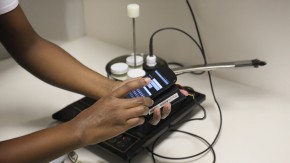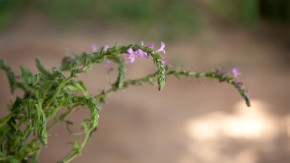
Have you ever gotten onto an elevator and realized, once the door shut, that somebody standing right next to you had doused himself with Axe body spray? If not, consider yourself lucky. If you have, then you know how unpleasant scent overload can be. Well, it turns out that humans aren't the only ones who feel that way. Dr. Laurence Zwiebel, a neuroscientist, molecular biologist, and entomologist at Vanderbilt University, has discovered that mosquitoes don't like it any more than we do, and he's using that fact to develop a powerful tool against malaria.
No disease in history has been more deadly than malaria. Some scientists estimate that it's killed half the people who have ever been born. That's a lot of damage - and it's all been done by one animal: the Anopheles mosquito, especially An. Gambiae, a species that prefers humans to any other animal when dinnertime comes around. The advent of insecticide-treated bed nets means they're not nearly the threat today than they used to be; in the last 20 years, malaria deaths have fallen by half. But the half that remains is huge: last year, malaria killed almost half a million people, the majority of them young children. What's more, in 2016, for the first time in decades, there were more cases of malaria than there had been the year before. Mosquitoes are developing resistance to the insecticides that have kept them in check.
But we don't have to kill mosquitoes to keep them from infecting us with malaria. Dr. Zwiebel has found a way to leave the mosquitoes alive while making them find humans much less appetizing. When we started working with Dr. Zwiebel, he'd been studying An. Gambiae for some time, and he'd already helped discover how humans' scent makes us so attractive to the mosquito. In 2005, when he and his colleagues received one of the original Grand Challenges in Global Health grants, they began taking the mosquito's olfactory system apart molecule by molecule, screening for new compounds that could attach themselves to the insect's smell receptors - essentially, looking for ways to disrupt the proteins on mosquitoes' antennae so that when hunger pangs struck they didn't head right for the nearest human.
They shouldn't have succeeded. To begin with, the Vanderbilt team was using a chemical library designed more for injectable drugs rather than insect repellents, and the cell-culture system they were using was optimized not for odor receptors but for pharmacological study. But, against all odds, they found a substance that did what they were hoping for - and it's ten thousand times more powerful than the spray you and I use to make sure we don't get bitten by insects at a picnic.
The typical bug repellent you buy at the store works by blocking the insect's olfactory system, confusing its sense of smell so that it has trouble detecting humans. VUAA (Vanderbilt University Allosteric Agonist), on the other hand, turns the mosquito's olfactory system all the way on, completely overwhelming its sense of smell. Imagine you're hungry and you see something that looks like a hamburger. Regular repellents would either remove its scent or, more likely, make it smell like something you couldn't identify, and you'd be suspicious enough to go for a hot dog instead. VUAA, on the other hand, would make the hamburger stink to high heaven - and send you running away as far and as fast as you could go. That's why they call it an "excito-repellent."
But the compound had an even bigger surprise in store: unlike DEET and other standard repellents, which target smell receptors found in some insects, VUAA targets a set of "partner" receptors that the mosquito shares with every other insect alive - and, just as important, with no animals that aren't insects. (This secondary set of receptors was discovered by two researchers who went on to receive a Grand Challenges in Global Health grant to study how to turn those receptors off.) Dr. Zwiebel and his colleagues didn't just discover a powerful mosquito repellent. They discovered an entirely new way to repel insects - all insects.
Zwiebel didn't stop with decoding the mosquito's olfactory system and discovering VUAA. With a Grand Challenges Explorations (GCE) grant to address disease transmission by mosquitoes biting outdoors, he worked to formulate the compound into something people could wear, whether it's in a shirt, a bracelet, or something else. In the middle of that grant, he went to a meeting of other GCE grant recipients, where he happened to meet representatives from GearJump - a company that makes wearable insect repellents and the recipient of a parallel GCE grant. They hit it off, and now they're working together to turn VUAA into something you and I - and a lot of people in areas where malaria is endemic - might be able to wear one day. Just as important, he's opened the door for scientists on a whole new way to protect us from the deadliest animal on earth.



